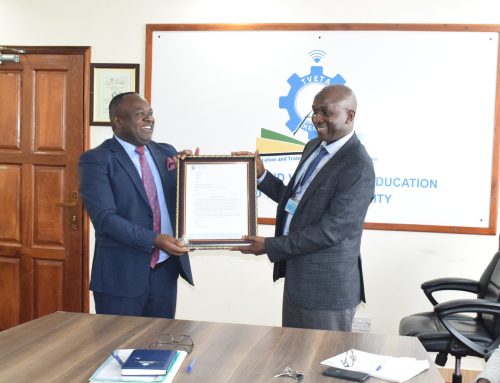By Dr. Kipkirui Langat
Kenya’s Technical and Vocational Education and Training (TVET) is undergoing rapid transformation. The Government’s priority and focus is on creating a workforce that meets industry requirements and youth entrepreneurs who shall contribute to the economy and create more jobs.
Kenya has taken various steps towards improving the access, relevance, quality and delivery of TVET. These include, among others, introduction of Competence Based Education and Training (CBET) for skill-based practical hands-on learning; Open and Distance E-learning (ODeL) for continuing training in times of pandemics such as COVID-19 and capacity building of trainers for improving the quality of training overall.
Professional development for trainers is widely recognised as a vital tool for educational reform. Greater emphasis is therefore being placed on the role of the trainers in the application of pedagogical learner-centred approaches in TVET. Trainers need to adopt personalised teaching strategies and inclusive programmes that respond to unique trainee needs, including those with disabilities, and a variety of employment tracks, including the option of innovation and entrepreneurship.
In order to remain relevant to market demand and technological changes, training of in-service trainers should incorporate innovative practices, both in course content and instructional pedagogy. Learner-centred pedagogy is believed by many stakeholders to do at least one of the following: make educational and training provision more responsive and accessible to learners; align it with the nature of learning processes; link it with the interests, capacities and needs of individual learners; and associate it with the learning outcomes defined in the curricula.
Occupational standards and curricula alone do not always provide pedagogical guidance and within a rapidly evolving TVET sector in Kenya. Therefore, there is a need for pedagogical training or retraining for trainers that can help trainers practically and effectively adopt contextualised training and learning methods to the needs of trainees for improved learning outcomes.
Kenya Technical Trainers College (KTTC) is mandated for training of trainers/instructors for all technical training institutions in the country. KTTC is tasked with effective delivery on the practical components of the training including for CBET, ODeL and others relevant to TVET that regular universities may not be providing within the TVET context.
Trainers must be exposed to and trained to utilise emerging technologies, industry trends in the classroom through systematic and continuing professional development (CPD). International standards by ILO and UNESCO on further and in-service training focus on the importance of such lifelong learning opportunities for all trainers in the interests of education and training quality, including the need to integrate the latest educational research and innovation approaches and technological advancements.
TVETA is mandated to ensure the quality, relevance of TVET and is focused on enhancing the skills of pre-service and in-service TVET trainers in both pedagogical and technical training. These trainings shall provide trainers with continuing life-long learning for improvement of professional qualification and updating of knowledge, skills and understanding for effective delivery CBETA approach.
For implementation of Continuous Professional Development (CPD), TVETA is developing the policy, standards, guidelines and framework for CPD of TVET trainers required for the development of a competent workforce. This is expected to be rolled out in the next one year.
For ensuring that Kenyan trainers are globally competitive and in keeping with the newer pedagogical and technological approaches within TVET, it is of utmost importance that trainers renew and update their skills by fully optimizing the various opportunities offered to them through CPD.
The writer is the Director Genera/CEO, TVET Authority
langat.langat@tveta.go.ke


